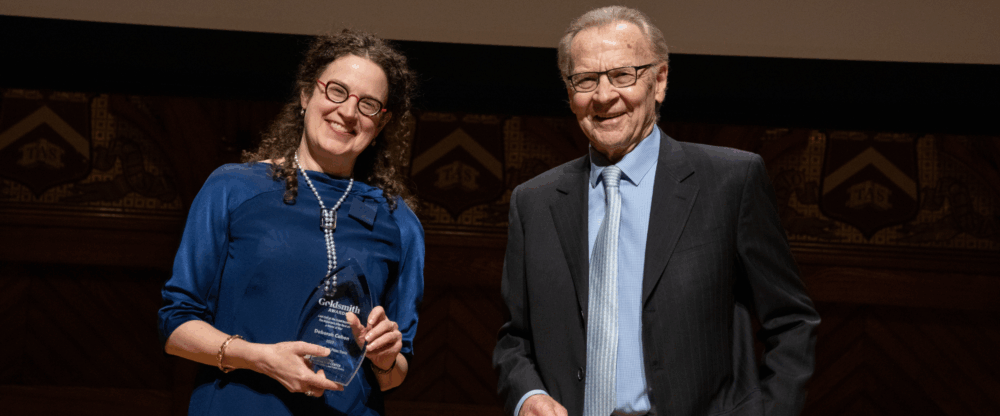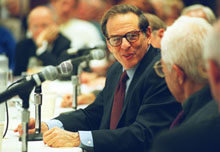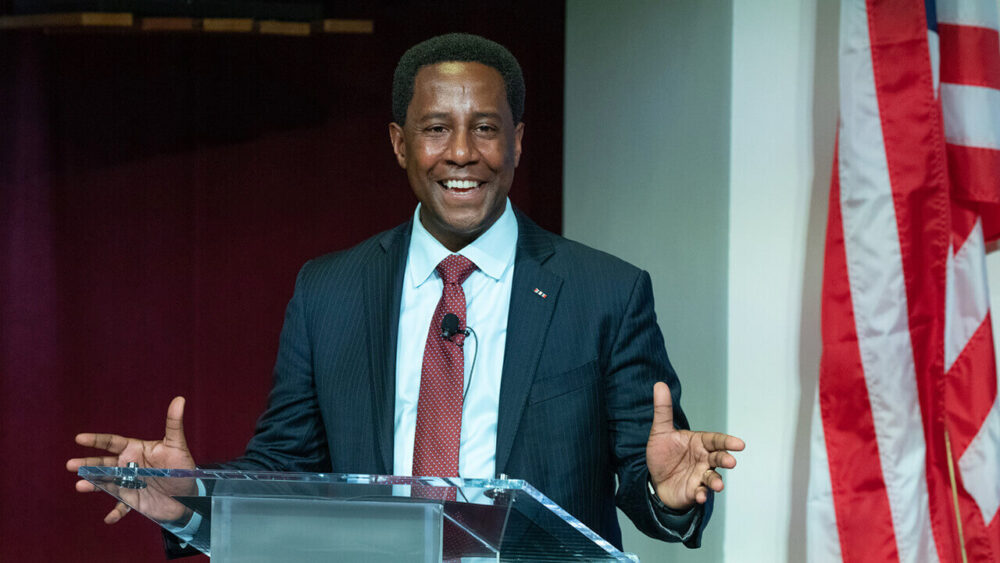
Nominations open for the 2026 Goldsmith Awards

October 28, 2003 — Robert A. Caro, biographer and Pulitzer Prize winning author of The Power Broker and Master of the Senate delivered the 2004 Theodore H. White Lecture in the John F. Kennedy Jr. Forum. His lecture was titled “Lyndon Johnson: Personality and Power.”
The following morning Caro joined a panel of prominent media figures for a lively discussion that probed Johnson’s ascent from the U.S. Senate to the vice presidency to president and his engineering of successful policies, such as his “Great Society” and the Civil Rights Act, and disastrous ones like the country’s involvement in Vietnam.
“When he was in the Senate, the Senate became as important as the executive branch,” said panelist Daniel Schorr, senior news analyst for National Public Radio. “Where Johnson was, the power tended to reside.”
In addition to Schorr, the panel, moderated by Alex Jones, lecturer in public policy and director of the Joan Shorenstein Center on the Press, Politics, and Public Policy at the Kennedy School, included Ernest R. May, Charles Warren Professor of American History at Harvard, and veteran journalists David Broder, Washington Post national political correspondent, and New York Times managing editor Jill Abramson.
A lifelong politician whose national career began during Franklin D. Roosevelt’s presidency, Johnson led the U.S. Senate from 1955 until he became vice president in 1960. “He was such a really dominating figure” in the Senate, May said, adding that when he compiled an index of a history of the United States he had written just after Kennedy died, he found his text had more entries for Johnson than for Kennedy.
More recently, reviewing tapes of Johnson’s presidency, May glimpsed the way Johnson brought his senatorial power into the White House with him, describing Johnson making phone call after phone call for up to eight hours a day. “You don’t get much evidence in these tapes that Johnson is consulting anyone. He’s concerned with getting things done. He’s an operator, an actor, somebody who’s using power,” he said.
Caro, a former Nieman Fellow, argued that Johnson wielded his power far more effectively in the Senate than in the White House, in part because of the different demands of the two positions.
“You saw in the Senate a guy who felt he was really in control,” said Caro, adding that Johnson was likely at his happiest as leader of the Senate. “You never had that sense of security as president.” Further, Caro noted that the job of the Senate — to get things done, largely behind closed doors — matched Johnson’s leadership style better than the demands of the White House.
“The power of the presidency is a moral power, it’s a bully pulpit,” said Caro. “Johnson was really unsuited for that.”
With the Shorenstein Center as a sponsor of Caro’s visit, the seminar examined the media implications of Johnson’s leadership. He was press savvy, realizing that Senate hearings could attract media attention, said Abramson, yet both Schorr and Caro added that he was ill at ease on television, to his detriment. “One of the transforming events that’s changed politics so much is the role of television and the burgeoning power of the press as another player in the power game in Washington,” said Abramson.
“Television is not only a medium of information for reporters, it is much more so a medium through which our leaders can transmit what they want to,” Schorr added. “Johnson was never terribly good at that.”
The panelists explored the legacy of Johnson’s dealings with the media. The Johnson presidency originated the credibility gap in our leaders that persists today, said Abramson. Before that, she said, “most people in the public and even the media gave the president the benefit of the doubt. The idea that lies would purposely be told was something very new and quite shocking.” By the time Nixon resigned, she said, that trust was replaced in the media by skepticism and even cynicism.
“The lies about Vietnam, the publishing of the Pentagon papers, changed journalism and its acceptance of official pronouncements from Washington in a forever kind of sense,” she said.
Panelists also drew cautious parallels between Johnson’s public portrayal of Vietnam and President Bush’s dealings in Iraq.
“The performance of the [Bush] administration in stressing the good side of signing on in Iraq is eerily like the Johnson administration’s handling of Vietnam,” said May.
This article was based on one written by Beth Potier of the Harvard News Office.


Center News

Center News